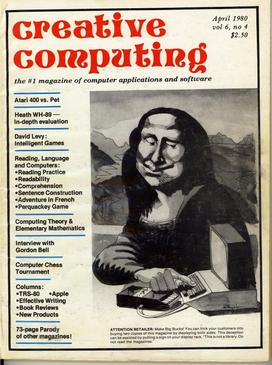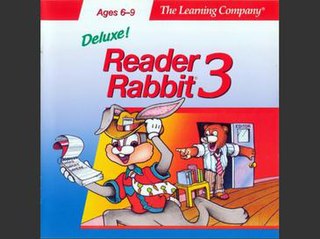
A memory card is an electronic data storage device used for storing digital information, typically using flash memory. These are commonly used in digital portable electronic devices, such as digital cameras as well as in many early games consoles such as the Nintendo Wii. They allow adding memory to such devices using a card in a socket instead of protruding USB flash drives.

Choplifter is a military themed scrolling shooter developed by Dan Gorlin for the Apple II and published by Broderbund in 1982. It was ported to Atari 8-bit computers the same year and also to the VIC-20, Commodore 64, Atari 5200, ColecoVision, MSX, and Thomson computers.

Creative Computing was one of the earliest magazines covering the microcomputer revolution. Published from October 1974 until December 1985, the magazine covered the spectrum of hobbyist/home/personal computing in a more accessible format than the rather technically oriented Byte.
Omnis Studio is a rapid application development (RAD) tool that allows programmers and application developers to create enterprise, web, and mobile applications for Windows, Linux, and macOS personal computers and servers across all business sectors.

Star Wars: DroidWorks is a 1998 edutainment computer game and the premiere title from LucasArts subsidiary Lucas Learning. It uses the same engine as LucasArts' previous title Star Wars: Jedi Knight. The creators aimed to create a game that would be both appealing and nonviolent. The game's original release date was moved up by months, which resulted in the development team cutting some planned game features.
Atari, Inc. is an American video gaming company based in New York City, and a subsidiary of the Atari SA holding company. It is the main entity serving the commercial Atari brand globally since 2003. The company currently publishes games based on retro Atari franchises as well as some new content, and also produces the new Atari 2600+ console. In the past it produced titles including Neverwinter Nights, Driver 3, Fahrenheit, RollerCoaster Tycoon 3 and Test Drive Unlimited.

Reader Rabbit 2 is a 1991 educational video game, the sequel to Reader Rabbit and the fourth game in the Reader Rabbit franchise. A facelift was given to the game's predecessor to match the graphical fidelity of Reader Rabbit 2.

Reader Rabbit 3 is a 1993 educational video game, part of the Reader Rabbit franchise. It was released for DOS that year, but was released for Windows and Macintosh in 1994 under the title "Reader Rabbit 3 Deluxe!".

PC Globe is an atlas for MS-DOS, Microsoft Windows, Apple Macintosh and Atari ST, first released in 1987 by Comwell Systems Inc. It offered information on 177 countries and dependencies.
Hell Cab is a 1993 adventure video game developed by Digital Fusion and published by Time Warner in 1993 for Macintosh, Windows 3.x.

Jewels of the Oracle is a 1995 adventure game developed by ELOI Productions and published by Discis Knowledge Research Inc. It was released on Macintosh, PlayStation, Sega Saturn, and Windows. A sequel developed by Bardworks and published by Hoffman and Associates was released in 1998 entitled Jewels II: The Ultimate Challenge.

Snooper Troops is a series of two 1982 adventure/educational video games developed by Spinnaker Software and published by Computer Learning Connection. They were released for the Apple II, Atari 8-bit computers, Commodore 64, and MS-DOS. The first case was entitled Snooper Troops: Case #1: The Granite Point Ghost and the second case entitled Snooper Troops: Case #2 - The Case of the Disappearing Dolphin was released later that year.

Reader Rabbit Toddler is a 1997 educational video game developed by KnowWare and published by The Learning Company. It is part of the Reader Rabbit series.

Word Attack! is a 1984 educational video game from Davidson & Associates for the Apple II and Atari 8-bit computers. An updated version was released as Word Attack! Plus.

Math Blaster Jr. is a 1996 educational video game in the Blaster Learning System series aimed at teaching mathematics to children aged 4–8. The game was rebranded as Math Blaster: Ages 4-6 in 1997.

Writer Rabbit is a 1986 educational video game, part of the Reader Rabbit franchise. It was remade as Reader Rabbit 3 for MS-DOS compatible operating systems in 1993, then re-released for Microsoft Windows and Macintosh in 1994 under the title "Reader Rabbit 3 Deluxe!".

Reader Rabbit's Interactive Reading Journey is a 1994 video game released on the Windows and Macintosh systems. It is the sixth game in the Reader Rabbit franchise. Designed for ages 4 till 7, the game introduces the new main characters Mat the Mouse and Sam the Lion who accompany Reader. It was then re-released in 1997 under the title "Reader Rabbit's Interactive Reading Journey For Grades K-1", followed by another in 1998 titled "Reader Rabbit's Reading Ages 4–6" and a personalized version in 1999.

Where in the World is Carmen Sandiego? is a game within the Carmen Sandiego franchise made for the Prodigy Interactive online service, a "special edition" and Prodigy service adaptation of the 1985 Broderbund educational game of the same name.
The Residents: Freak Show is a CD-ROM by The Voyager Company. A few years earlier they had released a similar work based on The Residents entitled Twenty Twisted Questions. The project was spearheaded by James Ludtke.
Nickelodeon Director's Lab is a movie-making interactive program by Viacom New Media and published by Nickelodeon. A sequel was released called Nickelodeon Multimedia Lab.















